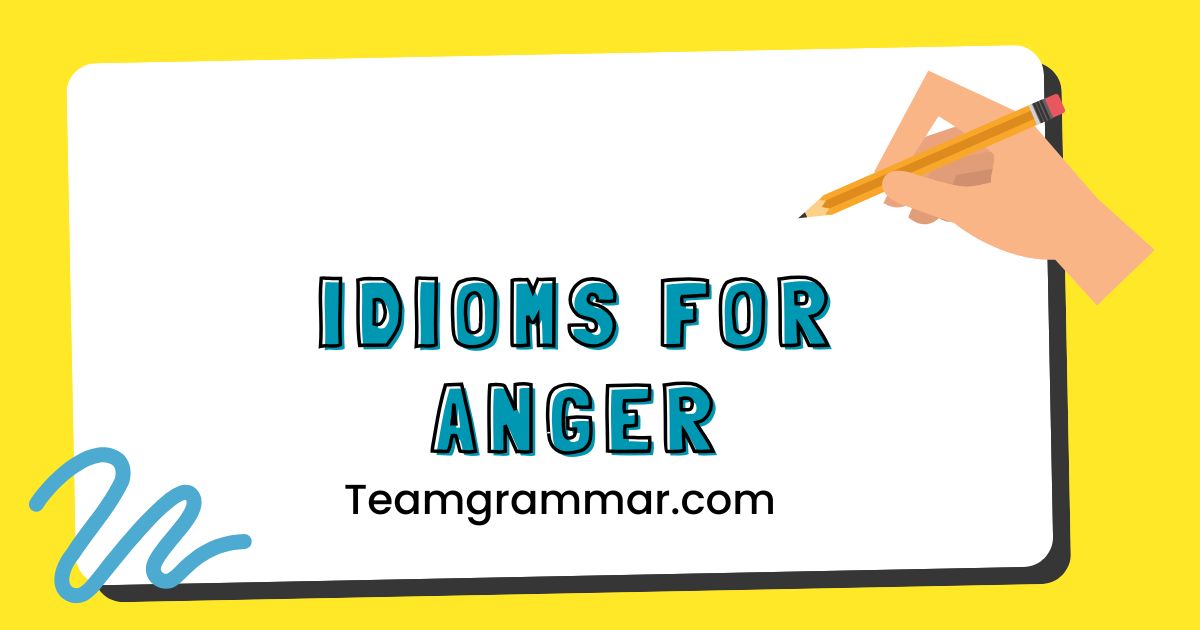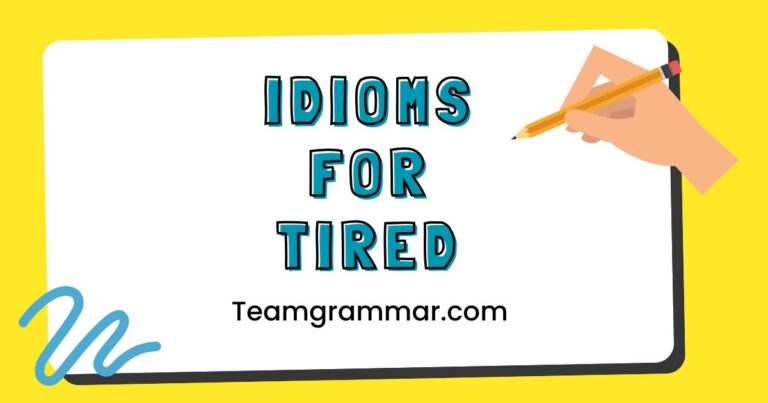35 Idioms for Anger: Mastering Expressive English
Understanding and using idioms effectively is crucial for mastering the nuances of the English language. When it comes to expressing emotions, idioms offer a vivid and colorful way to convey feelings that go beyond literal meanings.
This article focuses specifically on idioms related to anger, providing a comprehensive guide for English learners and native speakers alike. By exploring these idioms, you will gain a deeper understanding of how to express anger in various contexts, enhancing your communication skills and making your language more expressive and engaging.
This guide is perfect for students, teachers, writers, and anyone looking to enrich their vocabulary and improve their command of the English language.
Table of Contents
- Introduction
- Definition of Idioms for Anger
- Structural Breakdown of Anger Idioms
- Types and Categories of Anger Idioms
- Examples of Idioms for Anger
- Usage Rules for Anger Idioms
- Common Mistakes with Anger Idioms
- Practice Exercises
- Advanced Topics in Anger Idioms
- FAQ: Frequently Asked Questions
- Conclusion
Definition of Idioms for Anger
Idioms are expressions whose meanings cannot be understood from the literal definitions of the individual words. Instead, they carry a figurative meaning that is culturally and contextually specific.
Idioms for anger are phrases that describe different states and intensities of anger, from mild irritation to explosive rage. These idioms often use metaphors and similes to paint a vivid picture of the emotion.
Classification:Anger idioms fall under the broader category of emotional idioms, which are a subset of general English idioms. They can be further classified based on the intensity of anger they represent (e.g., mild annoyance, intense fury).
Another classification can be based on their structural type (e.g., phrasal verbs, similes, metaphors).
Function:The primary function of anger idioms is to express emotions in a more colorful and impactful way than literal language allows. They add depth and nuance to communication, allowing speakers to convey subtle shades of feeling.
They can also serve to soften the expression of anger, making it more palatable in certain social contexts, or to emphasize its intensity for dramatic effect.
Contexts:Anger idioms are used in a wide range of contexts, from informal conversations to formal writing. Their appropriateness depends on the audience, the relationship between speaker and listener, and the overall tone of the communication.
For example, an idiom like “seeing red” might be appropriate in a casual conversation, but less so in a formal business presentation. Understanding the context is crucial for using anger idioms effectively.
Structural Breakdown of Anger Idioms
Anger idioms exhibit various structural patterns. Understanding these patterns can help learners recognize and use them more effectively.
Phrasal Verbs:Some anger idioms are based on phrasal verbs, which consist of a verb and a particle (e.g., preposition or adverb). The particle changes the meaning of the verb, creating a new idiomatic meaning.
For example, “blow up” (to explode with anger) is a phrasal verb idiom.
Metaphorical Expressions: Many anger idioms use metaphors to compare anger to something else, creating a vivid image. For example, “to be boiling mad” uses the metaphor of boiling water to represent intense anger.
Similes: Similes use “like” or “as” to compare anger to something else. For example, “as mad as a hornet” compares someone’s anger to the aggressive nature of a hornet.
Fixed Expressions:Some anger idioms are fixed expressions, meaning they must be used exactly as they are. Changing the words can alter or destroy the idiomatic meaning.
For example, “hit the roof” is a fixed expression meaning to become very angry.
Clichés: While many idioms are effective, some have become clichés through overuse. It’s important to be aware of clichés and use them sparingly to avoid sounding unoriginal or trite.
Types and Categories of Anger Idioms
Anger idioms can be categorized based on several criteria, including their intensity, the metaphor they employ, and their structural type.
Intensity of Anger
This category classifies idioms based on how strongly they express anger, ranging from mild irritation to extreme rage.
- Mild Irritation: These idioms describe slight annoyance or frustration. Examples include “get under someone’s skin” and “rub someone the wrong way.”
- Moderate Anger: These idioms indicate a more significant level of anger. Examples include “be cross” and “have a bone to pick.”
- Intense Anger: These idioms express strong anger or fury. Examples include “see red” and “blow a fuse.”
- Extreme Rage: These idioms describe uncontrollable anger or rage. Examples include “go ballistic” and “fly off the handle.”
Metaphorical Basis
This category groups idioms based on the type of metaphor they use to represent anger.
- Fire Metaphors: These idioms use fire as a symbol of anger. Examples include “burn with anger” and “have a fiery temper.”
- Water Metaphors: These idioms use water to represent anger, often in terms of boiling or overflowing. Examples include “boil with rage” and “simmer down.”
- Animal Metaphors: These idioms compare anger to the behavior of certain animals. Examples include “as mad as a hornet” and “like a bear with a sore head.”
- Explosive Metaphors: These idioms use explosions as a symbol of sudden and intense anger. Examples include “blow up” and “go off like a bomb.”
Structural Type
This category classifies idioms based on their grammatical structure.
- Phrasal Idioms: These idioms are based on phrases that have a non-literal meaning. Examples include “in a huff” and “bent out of shape”.
- Verbal Idioms: These idioms include a verb and have a non-literal meaning. Examples include “bite someone’s head off” and “fly into a rage.”
- Adjectival Idioms: These idioms use an adjective to describe the state of anger. Examples include “livid” and “hopping mad.”
Examples of Idioms for Anger
This section provides a comprehensive list of anger idioms, organized by category, with examples to illustrate their usage.
Table 1: Idioms for Mild Irritation
The following table presents idioms used to express mild irritation or annoyance. These idioms are suitable for situations where the anger is not intense but still noticeable.
| Idiom | Meaning | Example Sentence |
|---|---|---|
| Get under someone’s skin | To irritate or annoy someone | His constant humming really gets under my skin. |
| Rub someone the wrong way | To irritate or annoy someone unintentionally | She tends to rub people the wrong way with her bluntness. |
| Bug someone | To annoy or bother someone | Can you stop tapping your foot? It’s bugging me. |
| Irk someone | To irritate or annoy someone | It irks me when people don’t replace the toilet paper roll. |
| Be a pain in the neck | To be annoying or bothersome | Dealing with this paperwork is such a pain in the neck. |
| Be a thorn in someone’s side | To be a constant source of annoyance or trouble | That old debt has been a thorn in his side for years. |
| Get on someone’s nerves | To irritate or annoy someone | The sound of the dripping faucet is getting on my nerves. |
| Grate on someone | To have an irritating effect | Her high-pitched voice really grates on me. |
| Rile someone up | To irritate or provoke someone | He gets riled up whenever politics are discussed. |
| Tick someone off | To annoy or irritate someone | The slow internet connection really ticks me off. |
| Drive someone up the wall | To irritate or annoy someone greatly | The children’s constant fighting is driving me up the wall. |
| Drive someone crazy | To irritate or annoy someone to the point of frustration | The repetitive nature of the job is driving me crazy. |
| Make someone’s blood boil | To cause someone to become very angry | The injustice of the situation made my blood boil. |
| Put someone’s nose out of joint | To offend or upset someone | He put her nose out of joint by criticizing her work. |
| Get someone’s back up | To annoy someone and cause them to become defensive | Criticizing his methods will only get his back up. |
| Wind someone up | To tease or annoy someone | He loves to wind up his sister by teasing her. |
| Be at the end of one’s tether | To have no patience or tolerance left | After a long day with the kids, I’m at the end of my tether. |
| Be fed up with | To be annoyed or disgusted with something | I’m fed up with his constant complaining. |
| Have had it up to here | To have reached the limit of one’s patience | I’ve had it up to here with his excuses. |
| Be browned off | To be annoyed or fed up (British English) | I’m feeling a bit browned off with this weather. |
| Get one’s goat | To annoy or irritate someone | His arrogance really gets my goat. |
| Ruffle someone’s feathers | To annoy or upset someone | He ruffled a few feathers with his controversial comments. |
| Nettled | Slightly annoyed or irritated | She was nettled by his constant interruptions. |
Table 2: Idioms for Moderate Anger
This table showcases idioms that express a moderate level of anger. These are suitable for situations where the anger is more pronounced but not yet at a boiling point.
| Idiom | Meaning | Example Sentence |
|---|---|---|
| Be cross | To be annoyed or angry | She was cross with him for being late. |
| Have a bone to pick | To have a grievance to discuss with someone | I have a bone to pick with you about the missing money. |
| Be in a bad mood | To be feeling irritable or angry | He’s been in a bad mood all day. |
| Be in a huff | To be in a state of petulant annoyance | She stormed off in a huff after the argument. |
| Be put out | To be annoyed or offended | He was put out by her lack of respect. |
| Be bent out of shape | To be annoyed or upset | Don’t get bent out of shape over such a small issue. |
| Get one’s dander up | To make someone angry | His rude remarks got my dander up. |
| Take exception to | To object strongly to something | I take exception to your accusations. |
| Be displeased | To be unsatisfied or annoyed | The manager was displeased with the team’s performance. |
| Have a chip on one’s shoulder | To be resentful or easily provoked | He has a chip on his shoulder about his past failures. |
| Smell a rat | To suspect something is wrong or dishonest | I smell a rat in this whole situation. |
| Get one’s back up | To become angry or defensive | Criticizing his work will only get his back up. |
| Be up in arms | To be angry and protesting about something | The residents are up in arms about the new development. |
| Take umbrage | To feel offended or annoyed | She took umbrage at his insensitive comments. |
| Be riled | To be annoyed or irritated | He was riled by the constant delays. |
| Have a fit | To become very angry or upset | My mother will have a fit when she finds out. |
| Be hot under the collar | To be angry or agitated | He was hot under the collar after the heated debate. |
| Be in a stew | To be in a state of anxiety or agitation | She’s been in a stew all morning waiting for the news. |
| Get one’s hackles up | To become angry and defensive | His aggressive tone got her hackles up. |
| Be cheesed off | To be annoyed or fed up (British English) | I’m cheesed off with this weather. |
| Be browned off | To be annoyed or fed up (British English) | He’s feeling browned off with his job. |
| Take something the wrong way | To be offended by something | She took my comment the wrong way and got upset. |
| Be piqued | To be irritated or resentful | She was piqued by his lack of attention. |
Table 3: Idioms for Intense Anger
The following table provides idioms for expressing intense anger or fury. These are used when the anger is strong and potentially explosive.
| Idiom | Meaning | Example Sentence |
|---|---|---|
| See red | To become extremely angry | When he saw the damage to his car, he saw red. |
| Blow a fuse | To become very angry | My dad blew a fuse when he found out I crashed the car. |
| Hit the roof | To become very angry | She hit the roof when she saw the mess they had made. |
| Go through the roof | To become very angry | My parents will go through the roof if they find out about this. |
| Fly off the handle | To lose one’s temper suddenly and violently | He tends to fly off the handle when he’s stressed. |
| Go ballistic | To become very angry or irrational | She went ballistic when she found out he had lied. |
| Blow one’s top | To lose one’s temper | He blew his top when he heard the news. |
| Go ape | To become very angry or excited | The fans went ape when the team won. |
| Foam at the mouth | To be extremely angry and agitated | He was foaming at the mouth with rage. |
| Lose one’s cool | To lose one’s temper | He lost his cool and started shouting. |
| Lose it | To lose control of one’s emotions, especially anger | She completely lost it when she heard the news. |
| Come unglued | To become very upset or angry | He came unglued when he realized his mistake. |
| Flip one’s lid | To become very angry or lose control | She flipped her lid when she saw the damage. |
| Burst a blood vessel | To become extremely angry | He almost burst a blood vessel when he heard the news. |
| Go postal | To become uncontrollably angry and violent | He nearly went postal after being fired. |
| Have a cow | To become very upset or angry | My mother will have a cow if she finds out. |
| Go spare | To become very angry or upset | He went spare when he realized he had lost his wallet. |
| Spit feathers | To be extremely angry or upset | She was spitting feathers after the argument. |
| Hit the ceiling | To become very angry | My boss hit the ceiling when he saw the report. |
| Go off the deep end | To become extremely angry or irrational | He went off the deep end after the argument. |
| Boil over | To lose one’s temper after a period of simmering anger | His anger finally boiled over and he confronted her. |
| Fly into a rage | To suddenly become very angry | He flew into a rage when he heard the news. |
| Be livid | To be extremely angry | She was livid when she found out the truth. |
Table 4: Idioms Using Animal Metaphors for Anger
This table focuses on idioms that use animal metaphors to describe anger. These idioms often draw on the perceived characteristics of animals to convey specific types of anger.
| Idiom | Meaning | Example Sentence |
|---|---|---|
| As mad as a hornet | Extremely angry and aggressive | She was as mad as a hornet after the insult. |
| Like a bear with a sore head | In a bad-tempered and irritable mood | He’s been like a bear with a sore head all morning. |
| Snapping turtle | Someone who is easily angered and prone to biting remarks | Be careful what you say; he’s a real snapping turtle today. |
| Foaming at the mouth (like a rabid dog) | Extremely angry and agitated | He was foaming at the mouth, yelling and cursing. |
| Have kittens | To be very anxious, upset, or angry | My mother will have kittens when she sees the mess. |
| Like a cat on a hot tin roof | Restless, agitated, or nervous | She was like a cat on a hot tin roof waiting for the results. |
| Barking mad | Completely insane or extremely angry | He was barking mad after the incident. |
| Bull in a china shop | A clumsy or tactless person who causes damage | He’s like a bull in a china shop when he gets angry. |
| Fight like cats and dogs | To argue or fight fiercely and frequently | They fight like cats and dogs all the time. |
| Mad as a March hare | Completely insane or extremely foolish | He’s as mad as a March hare if he thinks that will work. |
| Hold one’s horses | To control one’s anger or excitement | Just hold your horses; let’s think this through. |
| Get one’s goat | To annoy or irritate someone | His arrogance really gets my goat. |
| Ruffle someone’s feathers | To annoy or upset someone | He ruffled a few feathers with his controversial comments. |
| Have bats in the belfry | To be eccentric or slightly mad | He must have bats in the belfry to think that’s a good idea. |
| Smell a rat | To suspect something is wrong or dishonest | I smell a rat in this whole situation. |
| Cry wolf | To raise false alarms | If you keep crying wolf, no one will believe you when there’s real danger. |
| Let sleeping dogs lie | To avoid stirring up trouble | It’s best to let sleeping dogs lie and not bring up the past. |
| Dog eat dog | Ruthlessly competitive | It’s a dog eat dog world out there. |
| Have a bee in one’s bonnet | To be preoccupied with an idea or obsession | She has a bee in her bonnet about healthy eating. |
| Like a fish out of water | Uncomfortable in a new situation | He felt like a fish out of water at the formal event. |
| More than one way to skin a cat | More than one way to achieve a goal | There’s more than one way to skin a cat, so let’s try a different approach. |
| As stubborn as a mule | Very stubborn | He’s as stubborn as a mule and won’t change his mind. |
| As blind as a bat | Having very poor eyesight | Without my glasses, I’m as blind as a bat. |
Usage Rules for Anger Idioms
Using idioms correctly requires attention to several rules. These rules ensure that the idioms are used appropriately and effectively.
Contextual Appropriateness:Consider the context in which you are using the idiom. Some idioms are more appropriate for informal settings, while others are suitable for formal situations.
For example, “blow a fuse” is more casual than “take umbrage.”
Audience Awareness:Be mindful of your audience. Some idioms may not be familiar to non-native speakers or people from different cultural backgrounds.
It’s important to choose idioms that your audience will understand.
Grammatical Correctness: Ensure that the idiom is grammatically correct within the sentence. Idioms often have a fixed structure, and altering the words can change the meaning or make the sentence nonsensical.
Overuse Avoidance: Avoid overusing idioms, as this can make your language sound clichéd or unnatural. Use them sparingly to add emphasis and color to your speech or writing.
Understanding Nuances: Be aware of the subtle nuances of meaning that different idioms convey. Choose the idiom that best expresses the specific shade of anger you want to communicate.
Cultural Sensitivity: Be sensitive to cultural differences in idiom usage. Some idioms may have different connotations or be considered offensive in certain cultures.
Common Mistakes with Anger Idioms
Learners often make common mistakes when using idioms. Being aware of these mistakes can help you avoid them.
Literal Interpretation: One of the most common mistakes is interpreting idioms literally. Remember that idioms have a figurative meaning that is different from the literal meanings of the individual words.
Incorrect Word Order: Idioms often have a fixed word order, and changing the order can alter or destroy the meaning. For example, saying “red see” instead of “see red” is incorrect.
Using the Wrong Words: Substituting words in an idiom can change the meaning or make the idiom nonsensical. For example, saying “hit the ceiling” instead of “hit the roof” is incorrect.
Misunderstanding the Context: Using an idiom in the wrong context can make your communication sound awkward or inappropriate. Make sure you understand the context in which the idiom is typically used.
Overusing Idioms: Overusing idioms can make your language sound clichéd or unnatural. Use them sparingly and only when they add value to your communication.
Confusing Similar Idioms: Some idioms have similar meanings, but they are not interchangeable. Be aware of the subtle differences in meaning and choose the idiom that best expresses your intended message.
Examples of Correct vs. Incorrect Usage:
| Incorrect | Correct | Explanation |
|---|---|---|
| He saw blue when he heard the news. | He saw red when he heard the news. | “See red” is the correct idiom for extreme anger. |
| She blew a bulb when she found out. | She blew a fuse when she found out. | “Blow a fuse” is the correct idiom for losing one’s temper. |
| They are under arms about the decision. | They are up in arms about the decision. | “Up in arms” is the correct idiom for protesting angrily. |
| He has an axe to grind with her. | He has a bone to pick with her. | “Have a bone to pick” is the correct idiom for a grievance. |
| She is in a cloud because of the insult. | She is in a huff because of the insult. | “In a huff” is the correct idiom for petulant annoyance. |
Practice Exercises
These exercises will help you practice using anger idioms correctly. Choose the correct idiom to complete each sentence.
Exercise 1: Multiple Choice
Choose the correct idiom to complete each sentence.
| Question | Options | Answer |
|---|---|---|
| 1. When he saw the bill, he almost _________. | a) saw green b) saw red c) saw yellow | b) saw red |
| 2. She _________ when she found out he had lied. | a) blew a tire b) blew a fuse c) blew a gasket | b) blew a fuse |
| 3. They are _________ about the new policy. | a) up in legs b) up in arms c) up in hands | b) up in arms |
| 4. I _________ with you about the missing documents. | a) have a rock to pick b) have a stick to pick c) have a bone to pick | c) have a bone to pick |
| 5. She stormed off _________ after the argument. | a) in a cloud b) in a huff c) in a fog | b) in a huff |
| 6. His constant complaining really _________. | a) gets on my nerves b) gets on my toes c) gets on my elbows | a) gets on my nerves |
| 7. The children’s constant fighting is _________. | a) driving me up the wall b) driving me up the floor c) driving me up the roof | a) driving me up the wall |
| 8. The injustice of the situation _________. | a) made my blood freeze b) made my blood chill c) made my blood boil | c) made my blood boil |
| 9. Criticizing his methods will only _________. | a) get his front up b) get his back up c) get his side up | b) get his back up |
| 10. I’m _________ with his constant excuses. | a) have had it up to here b) have had it up to there c) have had it up to where | a) have had it up to here |
Exercise 2: Fill in the Blanks
Fill in the blanks with the correct idiom from the list provided.
Idiom List: see red, fly off the handle, get under my skin, up in arms, have a bone to pick
- His constant humming really _________. (Answer: gets under my skin)
- When he saw the damage to his car, he _________. (Answer: see red)
- She tends to _________ when she’s stressed. (Answer: fly off the handle)
- The residents are _________ about the new development. (Answer: up in arms)
- I _________ with you about the missing money. (Answer: have a bone to pick)
Exercise 3: Sentence Completion
Complete the following sentences using an appropriate anger idiom.
- After waiting for hours, his patience finally _________. (Answer: boiled over)
- The news that his project was rejected made him _________. (Answer: hit the roof)
- She couldn’t help but _________ when she heard the insulting remark. (Answer: take umbrage)
- He _________ when he found out his colleague had betrayed him. (Answer: went ballistic)
- The thought of having to work overtime again _________. (Answer: made his blood boil)
Advanced Topics in Anger Idioms
For advanced learners, exploring the nuances, origins, and cultural variations of anger idioms can provide a deeper understanding of the English language.
Etymology: Investigating the origins of idioms can reveal interesting insights into their meanings. For example, the idiom “get someone’s goat” is believed to have originated from the practice of placing a goat with a racehorse to calm it, and then removing the goat to unsettle the horse before the race.
Cultural Variations:Anger idioms vary across different English-speaking cultures. Some idioms may be more common in British English, while others are more prevalent in American English.
Understanding these variations can help you communicate more effectively with people from different backgrounds.
Literary Usage: Analyzing how anger idioms are used in literature can provide a deeper appreciation of their expressive power. Authors often use idioms to create vivid imagery and convey complex emotions.
Idiom Evolution: Idioms evolve over time, with new idioms emerging and old idioms falling out of use. Staying up-to-date with the latest trends in idiom usage can help you keep your language fresh and relevant.
FAQ: Frequently Asked Questions
This section addresses common questions about anger idioms.
- What is an idiom?
An idiom is a phrase or expression whose meaning cannot be understood from the ordinary meanings of the individual words. It has a figurative meaning that is culturally and contextually specific.
- Why are idioms important in English?
Idioms add color and expressiveness to the English language. They allow speakers to convey emotions and ideas in a more vivid and nuanced way. Understanding idioms is crucial for effective communication and comprehension.
- How can I learn new idioms?
You can learn new idioms by reading books, watching movies, listening to podcasts, and paying attention to how native speakers use language. It’s also helpful to keep a notebook of new idioms and practice using them in your own speech and writing.
- Are idioms the same in all English-speaking countries?
No, idioms vary across different English-speaking countries. Some idioms may be more common in British English, while others are more prevalent in American English. Be aware of these variations and use idioms that are appropriate for your audience.
- Can I create my own idioms?
While you can certainly be creative with language, idioms are typically established expressions that have gained widespread acceptance. It’s unlikely that a newly created idiom would be understood by others unless it catches on and becomes part of common usage.
- How do I know when to use an idiom?







